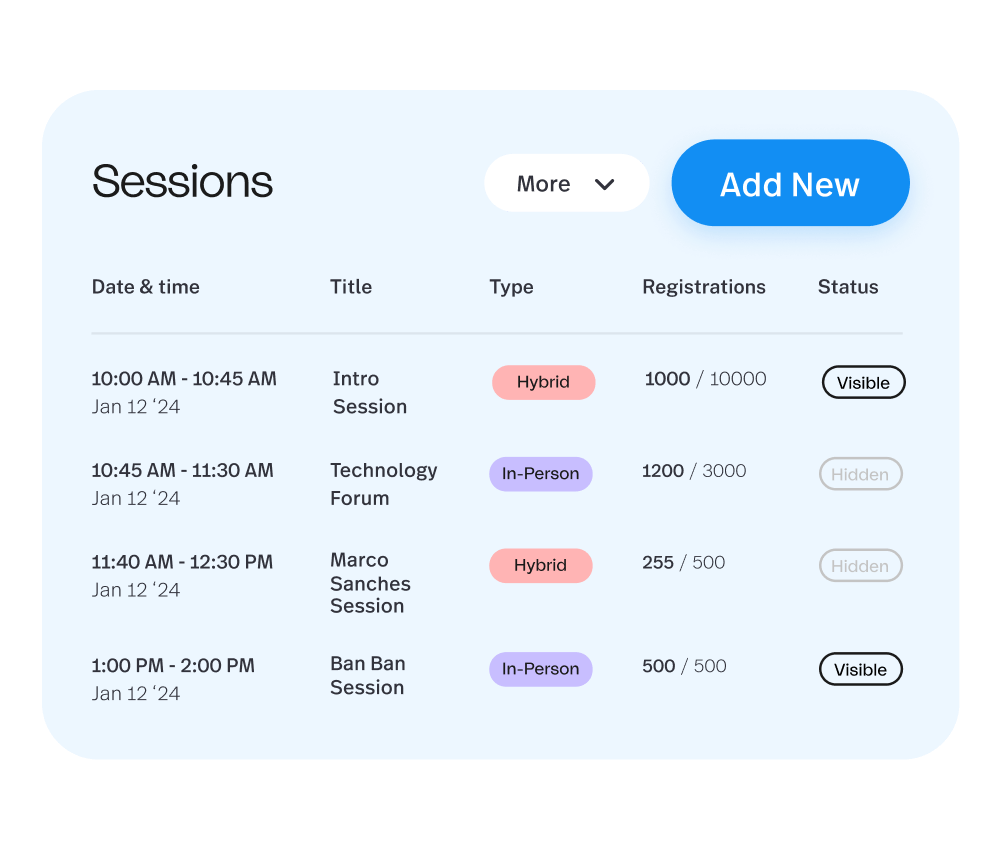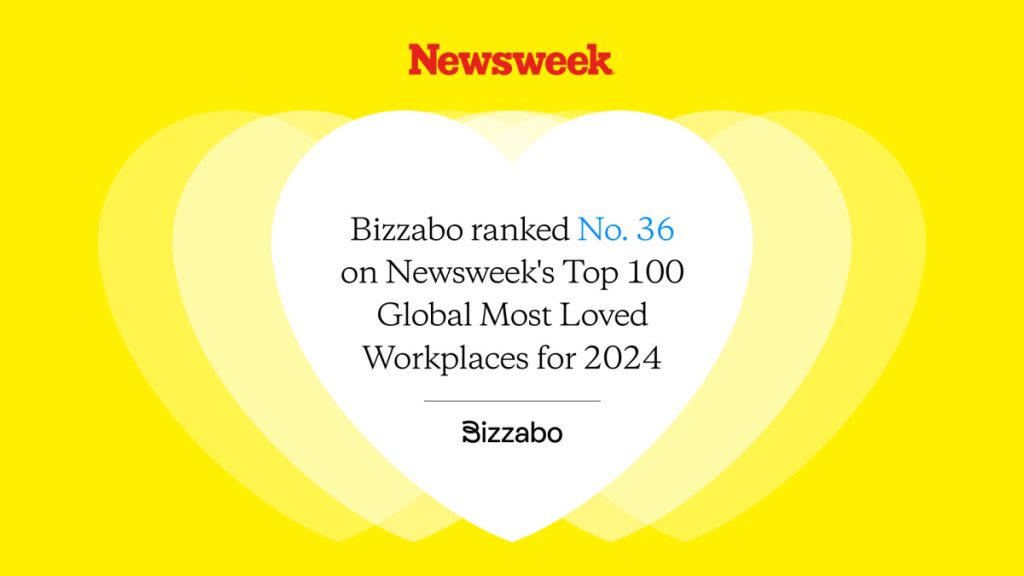Everything You Need to Know About Event Scheduling Software


When planning successful event experiences, event teams face myriad challenges. From venue selection, event promotion, and budget management to catering, logistics, and speaker selection, orchestrating an event end-to-end requires meticulous planning.
Event teams must be ready to respond to a variety of unexpected issues, such as last-minute changes, technical difficulties, and weather disruptions. Juggling these tasks is only possible when teams collaborate effectively and respond to problems swiftly.
To deliver a stellar attendee and sponsor experience, hit event goals, and prove ROI, event teams need powerful event scheduling software with a centralized platform for coordinating dates, venues, schedules, and participant details. With the right solution, event teams can seamlessly collaborate and automate processes to bake more efficiency into their workflows — and set the stage for a successful event.
What is Event Scheduling Software?
Event scheduling software is a digital tool that helps event teams plan and organize events efficiently. It assists with coordinating dates, venues, and participants, streamlining tasks such as sending invitations, managing RSVPs, coordinating hotel room block booking, and creating schedules.
By investing in a leading event scheduler software solution, teams can seamlessly collaborate and communicate while planning their events, increasing the chances of event success and higher attendee satisfaction.
What Are the Benefits of Using Event Scheduling Software?
By 2026, the event management software market is expected to eclipse $14.1 billion, up from the $7 billion the industry brought in during 2021. Based on the transformative benefits technology brings to event teams, this shouldn’t come as a surprise. Here are some of the key benefits of event scheduling software:
Time-saving and Efficiency
Event scheduling software automates many manual tasks, such as creating schedules, promoting events via email marketing campaigns, and managing speakers and sponsors. This significantly reduces the time and effort required for event planning.
According to Bizzabo data, 86.4% event organizers are planning to maintain or increase the number of events they put on in 2024. Investing in event scheduling systems makes it easier to scale your event strategy. Rather than spending time on repetitive tasks, teams can focus on strategic elements, ensuring smooth execution and the optimal use of resources.
Improved Accuracy and Reduced Errors
With features like automated data entry and real-time updates, event scheduling software reduces the risk of errors associated with manual processes and data entry. Accurate information on dates, venues, attendees, and speakers helps prevent missteps and ensures that the event unfolds according to plan, increasing the likelihood that you deliver a strong event experience.
Enhanced Communication and Collaboration
Event scheduling software provides a centralized platform for seamless communication and collaboration among team members and event participants. Real-time updates, shared calendars, and integrated communication tools keep everyone on the same page before, during, and after the event.
For example, if a speaker drops out at the last minute and you need to change the schedule for the day, you can quickly broadcast that information to attendees’ mobile devices, as long as you have the right tools in place.
Scalability and Flexibility for Different Event Sizes
Event scheduler software is designed to accommodate events of all shapes and sizes. Whether you’re organizing a small webinar or a massive trade show, the scalability and flexibility of the software allow you to adapt planning strategies, customize features, and efficiently manage events at different scales — all from the same centralized platform.

Types of Event Scheduling Software
While the benefits of event scheduler systems speak for themselves, you can’t invest in the first solution you stumble across and automatically expect great results. As you search for an event scheduler, here are some important nuances to remember.
Standalone Scheduling Tools vs. Integrated Event Management Systems
Standalone scheduling tools focus on managing event schedules, offering simplicity and dedicated functionality. If you go this route, you’ll have to cobble together a tech stack to handle event marketing, sponsor management, and event networking.
In contrast, integrated event management systems give you everything you need to orchestrate successful events. Leading solutions enable you to incorporate scheduling alongside registration, attendee management, and other event-related tasks, giving you everything you need to streamline the entire event planning process in one place.
Industry-specific Software vs. General-purpose Software
Industry-specific event scheduling software is tailored to the unique needs of particular events, like sports games and concerts. General-purpose software can be configured to support all different kinds of events across various industries, offering flexibility.
Although general-purpose tools often lack specific features critical for niche events, they are ideal for B2B event marketers since they can help them plan different event types.

Key Features You Need in Event Scheduling Software
To increase the chances your investment in technology pays off, make sure to pick a solution that includes these event management software features:
- Calendar management and synchronization: Event scheduling software with calendar management and synchronization enables users to efficiently coordinate dates, schedules, and timelines, ensuring everyone stays current with planning.
- Registration and attendee management: Look for a solution that makes it easy to register participants and manage their information. The right system should also help ensure a smooth check-in process, enhancing the overall experience for both event organizers and attendees.
- Payment processing capabilities: Seek out a solution that includes payment processing capabilities so you can securely handle financial transactions, including ticket sales and registration fees, providing a convenient and streamlined way to manage event finances.
- Reporting and analytics tools: Your event scheduler should enable you to collect valuable insights about event performance, attendee engagement, and other key metrics. Using this data, you can identify what’s working and what isn’t, making data-driven decisions to improve your event strategy.
- Customization and branding options: The ideal solution will be customizable, enabling you to tailor the software interface, registration forms, and other communication materials to align with your event’s branding and theme.
- Personalized journeys: Additionally, your event scheduler should enable you to create customized experiences for attendees by offering personalized content, agenda recommendations, interactive elements, and even AI-powered networking tools to make each event an unforgettable experience.
- Hotel room block booking integrations: Look for event software that combines scheduling and registration flows with hotel room block management, offering real-time reporting and a seamless attendee and organizer experience.
How To Choose the Right Event Scheduling System
As you begin narrowing down your options, take these important steps to increase the chances you select the best event scheduling system for your unique situation:
- Assess your event portfolio’s needs (e.g., size, scale, and volume of events)
- Understand your budget and cost considerations
- Read user reviews and testimonials to find out what real-world people are saying
- Request a demo of the solution to see it in action with your own eyes
Event Schedule Software: Common Challenges and Solutions
You’re bound to run into challenges when rolling out any new software solution. In this section, we examine the most common problems associated with event schedule systems — and what you can do to overcome them.
Challenge #1: Implementation
Implementing a new software solution is always challenging. By carefully planning the rollout, involving key stakeholders, and keeping your team in the loop, you can ensure a smooth transition to the new system.
Challenge #2: Training Staff and Team Members
People are resistant to change. By implementing a robust change management strategy that includes comprehensive training sessions, clear communication of benefits, robust documentation, and access to ongoing support, you can maximize user adoption.
Challenge #3: Integrating with Existing Systems and Workflows
The last thing you want is to invest in a system that doesn’t speak to the other tools your team uses every day. Look for a solution with flexible integration capabilities to ensure compatibility with other tools and seamlessly incorporate them into your workflows.
Challenge #4: Budget
Budget is always a concern for any expenditure. Do your due diligence to find a cost-effective solution that aligns with organizational needs. This is why investing in a comprehensive event management system instead of a standalone event scheduler may be the best choice.
Meet Bizzabo’s Event Scheduling Software
Bizzabo’s Event Experience OS is a leading event management solution that delivers powerful event scheduling tools and everything you need to put on the best events possible. With Bizzabo, event teams gain access to our event ticketing software features, which include the following:
- A seamless event registration platform
- Secure payment processing
- Optimization for mobile
- Real-time analytics and reporting
- Event marketing and promotional tools
- Customizable branding and ticketing
- An event app
- Event website building tools
- Attendee engagement features
- Check-in and onsite management tools
- Customer support and help desk
- Integrations with other marketing and events tools
- Speaker, moderator, and sponsor portals
- Smart event wearables
- Live chat and 1:1 messaging
- Polling, surveying, and Q&A tools
- And more!
Plus, did you know Bizzabo has a powerful integration with Resiada to provide a seamless experience from registration to hotel booking? Resiada, an award-winning room block management software, facilitates the consolidation of event blocks from multiple hotels, offering live reporting and protection against block pirating.
Resiada’s integration with Bizzabo allows for a bidirectional sync of registration and hotel data, ensuring a complete overview of attendee accommodations directly within your Bizzabo dashboard! Attendees can easily transition from ticket registration to hotel reservations, with all details conveniently displayed in the Bizzabo order section, enhancing the overall event planning and management process.
Get Started: Accelerate Your Event Strategy with Bizzabo
Choosing the right event scheduling software can profoundly impact the success of your event strategy — or the lack thereof. By taking a proactive approach and embracing technology, you can increase the chances your next event delivers the results you’re looking for.
If you want to implement an event scheduling solution, Bizzabo can help.
Not only does our platform make scheduling an event a breeze, it also includes all the features you need to orchestrate any event — from a sales kick-off to a user conference to an industry trade show and everything in between.
To learn more about how you can accelerate your event strategy with Bizzabo, request a demo today.



